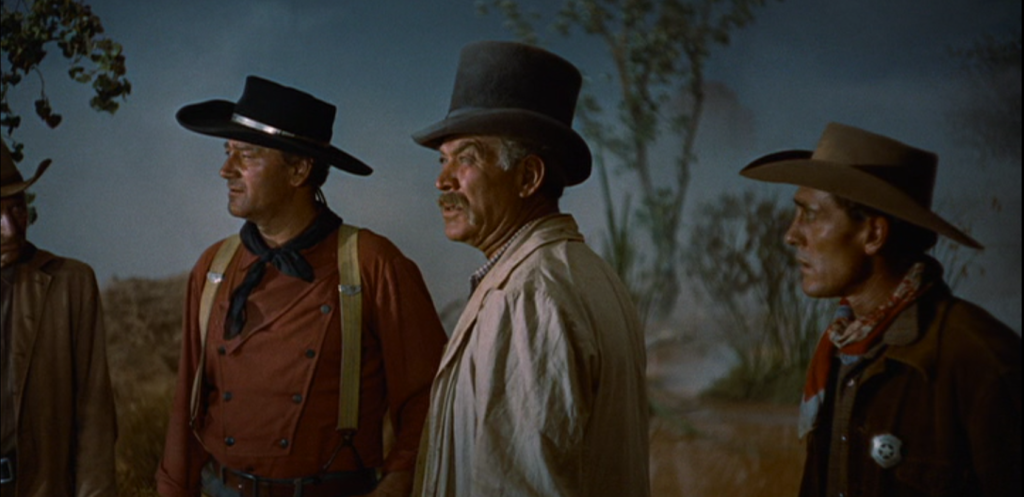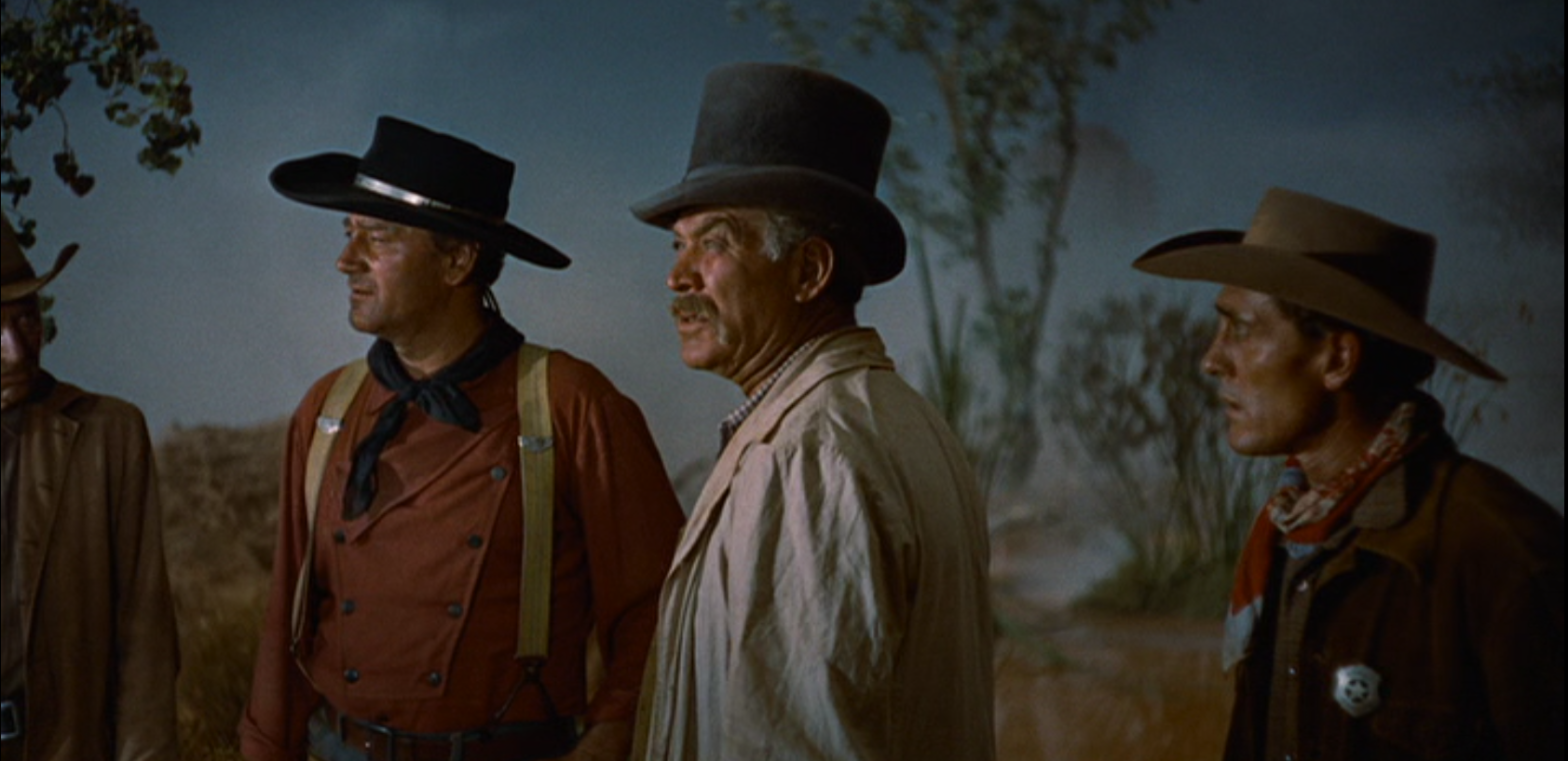Movie Review: The Searchers (1956) directed by John Ford
Texas, 1868: Ethan Edwards (John Wayne) finally returns to his childhood home, three years after the end of the American Civil War. He evades questions about where he’s been, though he was emphatically not in California. Ethan gets reacquainted with his brother Aaron’s family: wife Martha, eldest daughter Lucy, near-teen son Ben, and Debbie (Lana Wood), who was born shortly after Ethan left eight years ago. Uncle Ethan takes a shine to Debbie, gifting her a medal. He isn’t as pleased by Aaron’s adopted son Martin Hawley (Jeffrey Hunter) whose 1/8th Cherokee ancestry is clearly visible, even though he himself had saved the boy from a Comanche attack that orphaned him years ago.

The next morning, a posse led by Texas Ranger (and Reverend) Samuel Johnston Clayton (Ward Bond) arrives at the ranch. It seems that rustlers hit the nearby Jorgensen ranch and they need all the searchers they can get. Also in the party are the eccentric Mose Harper (Hank Worden), aging Lars Jorgensen (John Qualen) and his son Brad (Harry Carey Jr.) who is Lucy’s sweetheart. Ethan volunteers himself for Aaron’s place, despite some skepticism from Captain Clayton. Martin joins, thinking it a way to prove himself to “Uncle Ethan.”
Just as Martin is voicing his suspicions about the rustlers’ trail some hours later, the posse comes across cattle killed without their meat being taken. They realize that this was a distraction, the Comanche intend to strike as a war party at one of the unprotected sites. It’s too late. By the time they get back, Aaron, Ben and Martha are dead, and Lucy and Debbie have been abducted.
The men set out in search of the warband, and soon enough find what’s left of Lucy. Brad soon follows her into the grave.
Although it seems a lost cause to find Debbie before she dies or suffers a worse fate, Ethan vows to keep searching until he finds her, and Martin supports him. It will be years before the pair reach the end of this trail.
This is considered one of the great Western movies. starting with the wonderful scenery of Monument Valley filling in for the flatland of West Texas.
Ethan Edwards is an unusual role for John Wayne. He’s a man with a murky past, and an unregenerate Confederate, still wearing pieces of his Johnny Reb uniform three years later. He very much did not surrender his sword, and presumably still fully supports the cause of slavery. Ethan refuses to discuss what he did after the war, but it’s implied to be at least shady if not illegal. The medal he gives Debbie is conspicuously neither Union or Confederate. (Out of universe, it’s Serbian.) Ethan is openly racist towards people of Native American descent (other people are less open about it.) He has no compunction about ambushing opponents and shooting them in the back, desecrates a corpse out of cussedness, and kills more buffalo than he needs for food just to deny them to the natives.
By the end of the movie, it’s clear that Martin is the actual hero, wanting to still rescue Debbie (now played by Natalie Wood) while Ethan thinks it will be more merciful to kill her immediately.
Eventually, the searchers learn that Debbie was last seen with “Chief Scar” (Henry Brandon), a Comanche who constantly keeps on the move with his band and often lies about where he’s going next to evade trackers. He has his reasons for hating the white men, and seems to be Ethan’s opposite number.
There’s a subplot about Martin’s sweetheart Laurie Jorgensen (Vera Miles) being courted by the rather crass Charlie McCorry (Ken Curtis) while he’s gone. It’s understandable that she is tempted, given that Martin writes only one letter in five years, and mentions his short-lived accidental marriage to Comanche maiden Look (Beulah Archuletta) during the course of the missive. The comedy here can be a bit grating.
Speaking of comedy, Look’s part in the story is treated as hilarious by everyone who hears about it, since Martin doesn’t speak Comanche, Ethan didn’t bother warning him about the customs, and she is treated poorly by Martin as a result. And then her part ends tragically.
At least she’s played by a Native American, unlike the other major parts which had white actors in tan makeup. And the Comanche extras were played by Navajo making the background chatter hilarious if you understand that language. Hollywood’s gotten a little better at appropriate casting over the years. A little better.
The ending is particularly striking. Most of the surviving characters find at least some happiness, but Ethan realizes that he can never truly join them, and the door closes with him still outside.
Content notes: Violence, often ending in death. Several corpses are implied to be particularly gruesome, but we never see them. Death of children, rape is implied. Some rescued white captives are traumatized (or retraumatized by the “rescue”) into seeming insanity. Racism. Martin kicks Look when she tries to sleep near him. Animals are killed.
There are parts of this movie that haven’t aged well, or are a bit grating, but overall it’s one of the greats and well worth watching (especially since the acknowledgement of racism was very rare in Westerns of the time period, especially by protagonists.) It also allows you to fill in a lot of blanks yourself by implication. Parents of younger viewers may want to screen the movie first to see if their kids are up to it.


I’m not really a fan of old movies, but it does look like an interesting movie.